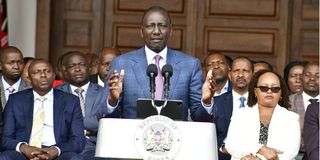Premium
Is this end of the road for ‘tumetenga’ promises?

President William Ruto addresses the media at State House, Nairobi on June 26, 2024.
What you need to know:
- Only real meaningful change can quench the spirit of revolution.
- It is now evident that the Kenya Kwanza regime is a tower of babel.
What does the army and the economy have in common? They both prefer discipline. Walk with me, I tell you how.
Perhaps fearful that this could be the end of the road, the discredited regime ordered the army onto the streets mid-week. That turn of events had many, including myself, worried that a bloodbath was imminent. All economies are afraid of blood. And ours is already shaky.
Ordinarily, the army’s job is to fight a defined, armed enemy. How would they handle the millions young, fearless, determined, but unarmed Gen Zs, who by then were tweeting “Thursday is a good day to die”? What would happen if the protestors breached the fences of State House as they had vowed to do?
Then there was the illegality of the move. The deployment was not sanctioned by the national assembly, itself having been routed out by the citizens hours earlier.
If ever there is an exercise of article 1 of the Constitution, then this was it. Having, to no avail, pleaded for months with their representatives not to make a bad and punitive law, the citizens had decided to exercise their sovereign powers directly.
Under a hail of bullets, they matched to occupy Parliament, as the world watched in amazement.
As the crisis unfolded, some rays of hope emerged. A day after treating the Republic to bravado and insults, the regime climbed down, abandoning the Finance Bill in its entirety as demanded by the citizens.
No doubt that move quenched the revolutionary spirit that was sweeping the nation, but only briefly. By now, the protesters were calling for the regime to go.
Kenya Kwanza tower of babel
And when they got to the streets, the army was exemplary. On patrol early Thursday afternoon, they were orderly, composed and professional, in sharp contrast to most of the police formations. The latter come across with an air of violence.
Soon a poster with two images emerged online. It shows rows upon rows of sullen cops blocking any access to State House on one side. On the other, jubilant protestors cheering as they walk alongside a KDF convoy in Nairobi CBD.
Obviously, there is no turning back. Only real meaningful change can quench the spirit of revolution. Could this be the end of the road for the KK regime? It is now evident that the regime is a tower of babel. Perhaps they always were.
However unobservant one might be, the signs have been everywhere. By the time the KK regime was 18 months into office, it was feeling like a life time of torment. Can we really survive for five years, a cabbie asked me last February?
For the majority of citizens, the economy had gone bottom up, I wrote that in February. Characteristic by then, the regime kept saying that they had no money, and would live within our means.
But wanton, extravagant expenditure was on display everywhere. Constant global travel, two or three times per month, to sign meaningless memorandum of understandings is costing Sh18 billion per year. In just 22 months of office, the regime has increased annual expenditure by Sh1 trillion.
The massive Sh400 billion per year tax increases are to finance this indiscipline. You cannot reduce expenditure by travelling more.
And claiming that you are creating jobs abroad is plain ridiculous. Which economy grows by educating their sons and daughters for menial jobs in the Middle East?
Wrong economic policies
Every so often someone will suggest that rather than criticizing, I should be giving advice to government on what is to be done.
No, thank you. Of one thing I am quite certain. The KK regime does not need policy advice. The senior KK politicians and economic managers are not new to government. Some have been there for more than 35 years.
Many served in senior economic management positions in the Kibaki government! They know what is to be done. But this regime is all about getting rich, in the shortest possible time.
They are pursuing the wrong economic policies because it serves their personal needs. Raising interest rates for example, is a lazy way to try and control imported inflation, because higher rates cannot control global food and fuel prices. But they hurt domestic production.
The regime heavies know very well that they should reduce interest rates, and use other alternatives to control inflation.
Ultimately, food prices have stabilized because we currently have good food supply, the result of unusually heavy rains. The point of the short-term subsidies they removed, was to support Kenyans while we waited for those rains.
Lower interest rates will assist the Republic get out the current debt distress, by rolling over existing domestic debt at lower rates. Lower interest rates will promote domestic production, creating jobs. But the regime borrows to finance wanton expenditure.
To attract Sh750 billion in domestic borrowing per year, they have to offer very high interest rates, and damn the consequences!
As much as Sh500 billion can be reduced in the current expenditure plans. To do so, you need fiscal discipline. Without it, what can citizens do?.
@NdirituMuriithi is an economist


